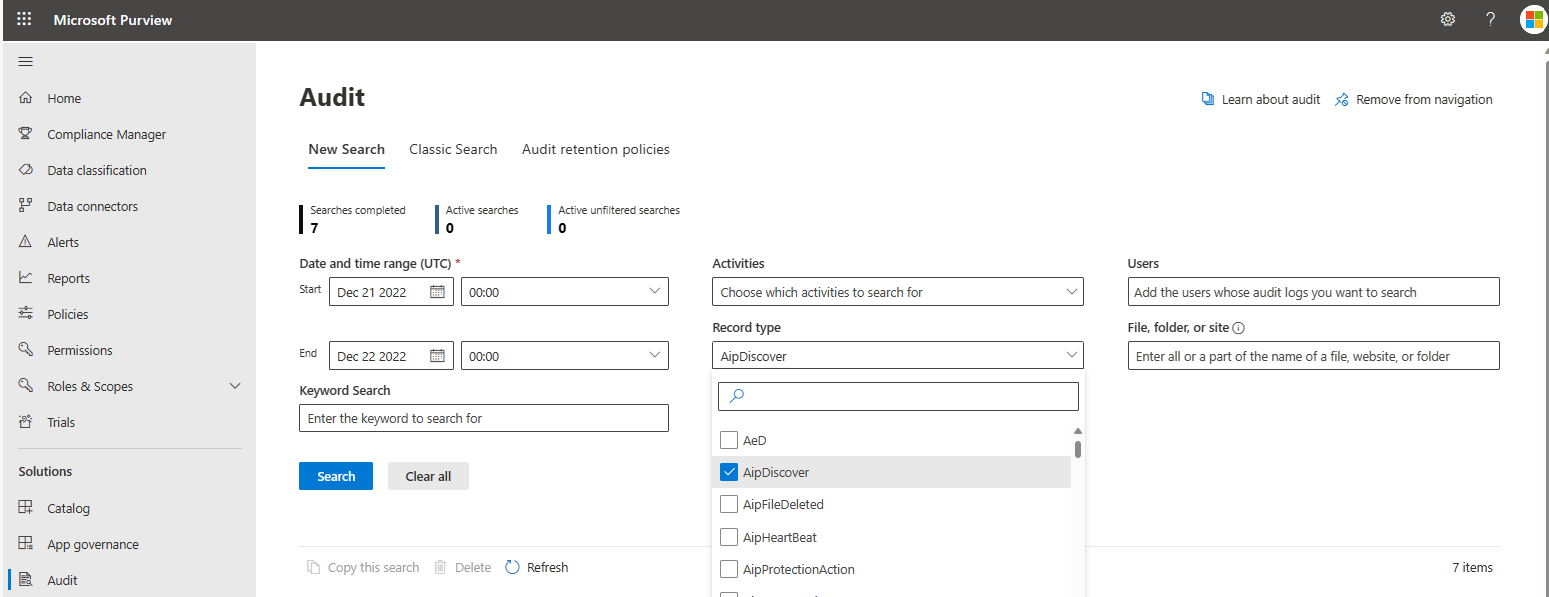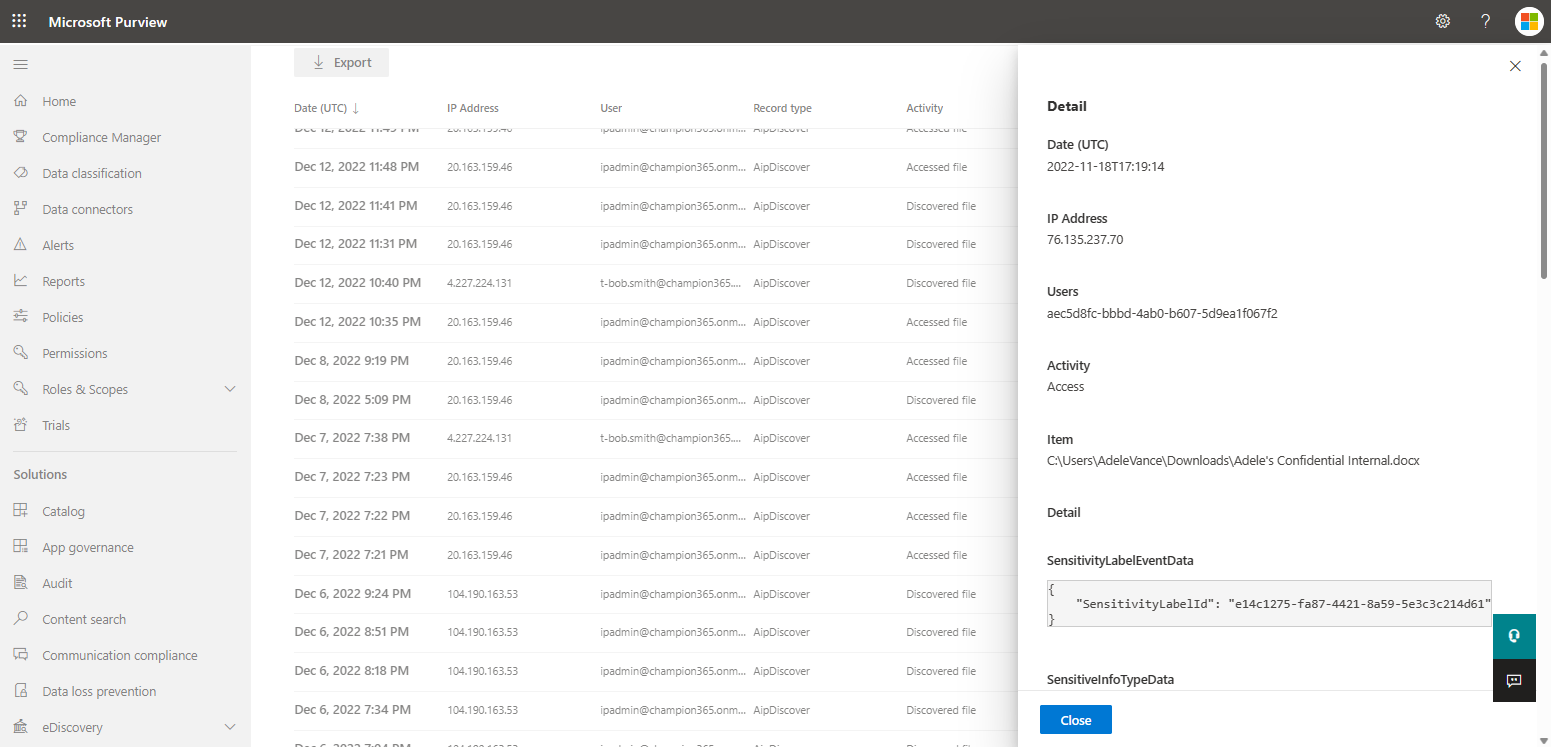AipFileDeleted
Azure Information Protection is a service that allows organizations to classify and label sensitive data, and apply policies to control how that data is accessed and shared.
AipFileDeleted is a type of event that is recorded in the Office 365 Unified Audit Log. AipFileDeleted events represent an attempt to deleted an Azure Information Protection (AIP) labeled file. Within the event, ResultStatus shows whether or not the file deletion was successful.
Access the Office 365 Unified Audit Log
The audit logs can be accessed using the following methods:
- The audit log search tool in the Microsoft Purview compliance portal.
- The Search-UnifiedAuditLog cmdlet in Exchange Online PowerShell.
- The Office 365 Management Activity API.
Audit log search tool
- Go to the Microsoft Purview compliance portal and sign in.
- In the left pane of the compliance portal, select Audit.
Note
If you don't see Audit in the left pane, see Roles and role groups in Microsoft Defender for Office 365 and Microsoft Purview compliance for information about permissions.
- On the New Search tab, set Record type to AipDiscover and configure the other parameters.

- Click Search to run the search using the criteria. In the results pane, select an event to view the results. Both discover and access operations can be viewed.

For more information on viewing the audit logs in the Microsoft Purview compliance portal, see Audit log activities.
Search Unified Audit Log in PowerShell
To access the Unified Audit Log using PowerShell, first connect to an Exchange Online PowerShell session by completing the following steps.
Establish remote PowerShell session
Once the connection is established, you can run Exchange Online cmdlets to manage your Exchange Online environment.
Open a PowerShell window and run the Install-Module -Name ExchangeOnlineManagement command to install the Exchange Online Management module. This module provides cmdlets that can be used to manage Exchange Online.
- Connect-IPPSSession is a PowerShell cmdlet used to create a remote connection to an Exchange Online PowerShell session.
- Import-Module ExchangeOnlineManagement is a PowerShell cmdlet used to import the Exchange Online Management module into the current PowerShell session.
# Import the PSSSession and Exchange Online cmdlets
Connect-IPPSSession
Import-Module ExchangeOnlineManagement
Connect with a specific user
Command to prompt for a specific user for your Exchange Online credentials.
$UserCredential = Get-Credential
Command to connect to Exchange Online using the provided credentials.
Connect-ExchangeOnline -Credential $UserCredential -ShowProgress $true
Connect with credentials in the current session
Connect to Exchange Online using the credentials in the current session
Connect-ExchangeOnline
Search-UnifiedAuditLog cmdlet
The Search-UnifiedAuditLog cmdlet is a PowerShell command that can be used to search the Office 365 Unified Audit Log. The Unified Audit Log is a record of user and administrator activity in Office 365 that can be used to track events. For best practices on using this cmdlet, see Best Practices for using Search-UnifiedAuditLog.
To extract the AipFileDeleted events from the Unified Audit Log using PowerShell, you can use the following command. This will search the Unified Audit Log for the specified date range and return any events with the record type "AipFileDeleted". The results will be exported to a CSV file at the specified path.
Search-UnifiedAuditLog -RecordType AipFileDeleted -StartDate (Get-Date).AddDays(-7) -EndDate (Get-Date) | Export-Csv -Path <output file>
The following is an example of AipFileDeleted event from PowerShell.
RecordType : AipFileDeleted
CreationDate : 12/22/2022 8:50:10 PM
UserIds : ipadmin@champion365.onmicrosoft.com
Operations : FileDeleted
AuditData :
{
"SensitiveInfoTypeData":[],
"Common":{
"ApplicationId":"c00e9d32-3c8d-4a7d-832b-029040e7db99",
"ApplicationName":"Microsoft Azure Information Protection Scanners",
"ProcessName":"MSIP.Scanner",
"Platform":1,
"DeviceName":"AIPSCANNER1.mscompliance.click",
"Location":"On-premises file shares",
"ProductVersion":"2.14.90.0"
},
"DataState":"Rest",
"ObjectId":"fileshare\capacity\Data8\docs - Copy - Copy (7) - Copy\_creds\Acme Request for Time Off.doc",
"UserId":"AdeleV@champion365.onmicrosoft.com",
"UserId":"mipscanner@kazdemos.org",
"ClientIP":" 52.159.112.221",
"Id":"8417bbf6-3469-57bf-d48e-ee80f34c3d71",
"RecordType":96,
"CreationTime":"2022-12-22T20:50:10",
"Operation":"FileDeleted",
"OrganizationId":"ac1dff03-7e0e-4ac8-a4c9-9b38d24f062c",
"UserType":5,
"UserKey":"cab9530a-5b06-4c61-b09b-590fda6a40f8",
"ResultStatus":"Succeeded"
}
ResultIndex : 9
ResultCount : 11
Identity : 2e7b94ee-92f7-480f-8b14-89d4bc0c0e43
IsValid : True
ObjectState : Unchanged
Note
This is just an example of how you can use the Search-UnifiedAuditLog cmdlet. You may need to adjust the command and specify additional parameters based on your specific requirements. For more information on using PowerShell for unified audit logs, see search unified audit log.
Office 365 Management Activity API
In order to be able to query the Office 365 Management API endpoints, you'll need to configure your application with the right permissions. For a step-by-step guide, see Get started with Office 365 Management APIs.
The following is an example of AipFileDeleted event from REST API.
TenantId : bd285ff7-1a38-4306-adaf-a367669731c3
SourceSystem : RestAPI
TimeGenerated [UTC] : 2022-12-04T21:59:50.7763106Z
EventCreationTime [UTC] : 2022-12-01T22:10:41Z
Id : 8417bbf6-3469-57bf-d48e-ee80f34c3d71
Operation : FileDeleted
OrganizationId : ac1dff03-7e0e-4ac8-a4c9-9b38d24f062c
RecordType : 96
UserType : 5
Version : 1
Workload : Aip
UserId : mipscanner@kazdemos.org
UserKey : cab9530a-5b06-4c61-b09b-590fda6a40f8
ResultStatus : Succeeded
Scope : 1
ClientIP : 52.159.112.221
Common_ApplicationId : c00e9d32-3c8d-4a7d-832b-029040e7db99
Common_ApplicationName : Microsoft Azure Information Protection Scanner
Common_ProcessName : MSIP.Scanner
Common_Platform : 1
Common_DeviceName : AIPSCANNER1.mscompliance.click
Common_ProductVersion : 2.14.90.0
ObjectId : \\fileshare\capacity\Data8\docs - Copy - Copy (7) - Copy\_creds\Acme Request for Time Off.doc
SensitiveInfoTypeData : []
Common_Location : On-premises file shares
DataState : Rest
Type : AuditGeneral_CL
Attributes of the AipFileDeleted event
| Event | Type | Description |
|---|---|---|
| ApplicationId | GUID | The ID of the application performing the operation. |
| ApplicationName | String | Friendly name of the application performing the operation. (Outlook, OWA, Word, Excel, PowerPoint, etc.) |
| ClientIP | IPv4/IPv6 | The IP address of the device that was used when the activity was logged. For some services, the value displayed in this property might be the IP address for a trusted application (for example, Office on the web apps) calling into the service on behalf of a user and not the IP address of the device used by person who performed the activity. |
| CreationTime | Date/time | The date and time in Coordinated Universal Time (UTC) when the user performed the activity. |
| DataState | String | Rest = File was not open when event was logged Use = File was in use when event was logged. |
| DeviceName | String | The device on which the activity happened. |
| Id | GUID | Unique identifier of an audit record. |
| IsProtected | Boolean | States whether or not the data is protected with encryption. |
| Location | String | The location of the document with respect to the user's device. |
| ObjectId | String | File full path (URL) that is being accessed by the user. |
| Operation | String | The operation type for the audit log. For AipFileDeleted, operation is FileDeleted. |
| OrganizationId | GUID | The GUID for your organization's Office 365 tenant. This value will always be the same for your organization, regardless of the Office 365 service in which it occurs. |
| Platform | Double | The platform where the activity occurred from. 0 = Unknown 1 = Windows 2 = MacOS 3 = iOS 4 = Android 5 = Web Browser |
| ProcessName | String | The relevant process name (Outlook, MSIP.App, WinWord, etc.) |
| ProductVersion | String | Version of the AIP client. |
| RecordType | Double | The type of operation indicated by the record. 96 represents an AipFileDeleted record. |
| ResultStatus | String | Indicates whether or not the file deletion succeeded. |
| Scope | Double | 0 represents that the event was created by a hosted O365 service. 1 represents that the event was created by an on-premises server. |
| SensitiveInfoTypeData | String | The sensitive information types that have been discovered within the data. |
| SensitivityLabelId | GUID | The current MIP sensitivity label GUID. Use cmdlt Get-Label to get the full values of the GUID. |
| UserId | String | The User Principal Name (UPN) of the user who performed the action that resulted in the record being logged. |
| UserKey | GUID | An alternative ID for the user identified in the UserId property. This property is populated with the passport unique ID (PUID) for events performed by users in SharePoint, OneDrive for Business, and Exchange. |
| UserType | Double | The type of user that performed the operation. 0 = Regular 1 = Reserved 2 = Admin 3 = DcAdmin 4 = System 5 = Application 6 = ServicePrincipal 7 = CustomPolicy 8 = SystemPolicy |